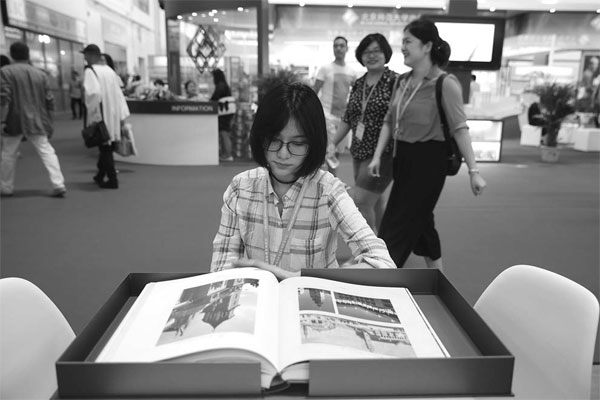Chinese publishers take on the international market
font-size:

Increased participation at the Beijing International Book Fair shows world's growing interest
The annual Beijing International Book Fair is serving as a bridgehead for Chinese copyright-based sectors going global, with more than 5,000 copyright deals signed at this year's session, up 6.3 percent from a year ago.
More than 2,400 exhibitors from 86 countries and regions displayed their books at the fair, more than 10 times the 224 exhibitors from 35 countries and regions at its first session 30 years ago.
The five-day event attracted some 300,000 visits this year.
Among the participants are Hussein Ibrahim Morsy, a cultural, educational and technological counselor at the Egyptian embassy in China, who has participated in the annual event for three consecutive years.
With his introduction, a book concerning the history of literary exchanges between Chinese and Arab peoples, published by Shandong Education Press, has been exported to Egypt.
"I've read the book, a terrific work. It painted an overall picture of literature exchanges between China and the Arab communities over the past," the regular visitor told People's Daily in fluent Chinese.
Egyptians are quite interested in contemporary China, he said, adding that after more than 10 Chinese novels have been translated into Arab for publication in his homeland, Chinese novelists including Mo Yan, Su Tong and Wang Anyi are popular with Egyptian readers.
Biographies of Chinese entrepreneurs, including Li Yanhong, head of internet giant Baidu and Wang Chuanfu, chairman of automaker BYD, enjoy greater popularity among young Egyptians, the counselor said. "They were not rich at the beginning but made their way from being poor to entrepreneurs. Their biographies give our youths who also desire success in startups motivation and hope."
Kim Tae Sung, a Korean translator of more than 100 Chinese literature books, and one of 19 winners of this year's government-sponsored Special Book Award of China for foreign authors, translators and publishers, has witnessed a dramatic change in the South Korean market for Chinese copyright exports over the past decade.
Kim recalled that he himself paid a visit to China for Chinese book purchases and translation more than 10 years ago, yet the Korean publication industry showed little interest in China-related books.
In contrast, such books have become profit earners of press houses. As a result, a throng of publishers have contacted him for more translations. He has more than 10 Chinese books on his current work agenda.
While traditional culture, literature and Chinese language textbooks remained popular at the fair, other motifs including high-speed trains, jetliners and the country's contemporary values have emerged as new hot topics.
Shanghai Jiao Tong University Press has exported scores of technological books to world-renowned publishers Springer Group, headquartered in Germany, and Elsevier, headquartered in the Netherlands, including those concerning jetliner engineering and nuclear technology.
Its editor-in-chief, Liu Peiying, said mainstream international publishing houses have recently paid great attention to technological books. With these publishing houses, Liu's team has introduced top academic achievements from China to the world.
Shanghai University Press reported an annual export of more than 50 copyrights over the past five years.
Wu Shulin, executive vice-president of the Publishers Association of China, said that while the Chinese academic publication sector had a weak voice worldwide, China is likely to become a new world hub on the global publishing landscape in the future, with a growing number of technological innovations originating in the country.
Yan Xiaohong, deputy head of the National Copyright Administration, called on Chinese publishers to pay more attention to copyright quality.
"Improving quality comes first, whether in the case of creating original works or bringing in imports," he said.
He also suggested tapping into the market potential in developing countries, such as Egypt, rather than merely eyeing developed economies.
Yan Guanglei, a copyright agent, said for a Chinese book, it is hard to become a blockbuster in the US market, where English books are the majority and translated works have never surpassed 3 percent of the total market shares.
In comparison, European countries are more open to foreign cultures and Asian countries including South Korea, Thailand and Vietnam have growing demand for Chinese books, he said.
-
Previous:
-
Next:






